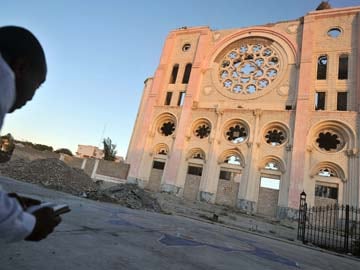
A man reads the New Testament in front of Cathedral of Port-au-Prince. The cathedral was destroyed in the January 12, 2010 earthquake.
Port-au-Prince:
Four years after Haiti was hit by a violent earthquake, the dragging pace of reconstruction is nowhere more apparent than the capital, where its landmark presidential palace and cathedral remain in ruins.
Devastation caused by the January 12, 2010 disaster, which killed more than 250,000 people, is still felt keenly in Port-au-Prince, the capital of the Americas' poorest country.
"We are going to press on the accelerator to advance the main projects, and Haitians will be proud of reconstruction," Prime Minister Laurent Lamothe told the press Friday, presenting models of several public buildings that are under construction.
Faced with criticism over the slow rebuilding of administrative buildings, including the legislative palace, Lamothe called on Haitians to unite together.
"Reconstruction is a shared concern, not just for President Michel Martelly and the government," Lamothe said.
Dieudonne Saincy, spokesman for an opposition party, however, accused the current government of "completely passing over the plan for rebuilding the country, which was negotiated with international donors."
He also acknowledged, however, that part of the problem was that some of the promised international aid was never disbursed.
He and Lamothe also both agreed that a large portion of the money -- some 42 percent -- had been spent on the post-earthquake emergency and not for reconstruction.
"We were lucky to have help from Venezuela. Most of our projects were accomplished with Venezuelan money. With slim means, we accomplished a lot of things," Lamothe told AFP, expressing hope that the international community might pony up what remains to be paid.
Saincy said that political crisis had also caused diversion from the reconstruction projects.
Haiti has recently seen an increase in anti-government protests, giving rise to clashes.
Apart from calling for the resignation of Martelly, who has been in office since 2011, demonstrators are also demanding better living conditions.
Plans for rebuilding Port-au-Prince were presented to the public, but the construction never occurred.
"Reconstruction of the capital will require the creation of a new downtown and the creation of an administrative center," Lamothe said.
More than a million people were left homeless and 42 public buildings were destroyed during the 2010 earthquake.
"The country was deeply hurt... we have resettled the homeless and the construction of seven ministry and public offices is underway" Lamothe told AFP during an interview.
However, nearly 200,000 people are living in dire conditions in temporary shelters, and residents complain of having received little help since NGOs left.
Meanwhile, civic organizations have called on the government to stop forced evictions, which have recently multiplied.
And the prime minister has asked the international community to provide promised aid of nearly $9 billion.
"If the international community had fulfilled its commitment, we would have accomplished 10 times more than we have achieved," Lamothe said.
"We must continue to make the international community aware" he said.
"But Haiti is better off four years after the earthquake even if there remains much to be done."
Devastation caused by the January 12, 2010 disaster, which killed more than 250,000 people, is still felt keenly in Port-au-Prince, the capital of the Americas' poorest country.
"We are going to press on the accelerator to advance the main projects, and Haitians will be proud of reconstruction," Prime Minister Laurent Lamothe told the press Friday, presenting models of several public buildings that are under construction.
Faced with criticism over the slow rebuilding of administrative buildings, including the legislative palace, Lamothe called on Haitians to unite together.
"Reconstruction is a shared concern, not just for President Michel Martelly and the government," Lamothe said.
Dieudonne Saincy, spokesman for an opposition party, however, accused the current government of "completely passing over the plan for rebuilding the country, which was negotiated with international donors."
He also acknowledged, however, that part of the problem was that some of the promised international aid was never disbursed.
He and Lamothe also both agreed that a large portion of the money -- some 42 percent -- had been spent on the post-earthquake emergency and not for reconstruction.
"We were lucky to have help from Venezuela. Most of our projects were accomplished with Venezuelan money. With slim means, we accomplished a lot of things," Lamothe told AFP, expressing hope that the international community might pony up what remains to be paid.
Saincy said that political crisis had also caused diversion from the reconstruction projects.
Haiti has recently seen an increase in anti-government protests, giving rise to clashes.
Apart from calling for the resignation of Martelly, who has been in office since 2011, demonstrators are also demanding better living conditions.
Plans for rebuilding Port-au-Prince were presented to the public, but the construction never occurred.
"Reconstruction of the capital will require the creation of a new downtown and the creation of an administrative center," Lamothe said.
More than a million people were left homeless and 42 public buildings were destroyed during the 2010 earthquake.
"The country was deeply hurt... we have resettled the homeless and the construction of seven ministry and public offices is underway" Lamothe told AFP during an interview.
However, nearly 200,000 people are living in dire conditions in temporary shelters, and residents complain of having received little help since NGOs left.
Meanwhile, civic organizations have called on the government to stop forced evictions, which have recently multiplied.
And the prime minister has asked the international community to provide promised aid of nearly $9 billion.
"If the international community had fulfilled its commitment, we would have accomplished 10 times more than we have achieved," Lamothe said.
"We must continue to make the international community aware" he said.
"But Haiti is better off four years after the earthquake even if there remains much to be done."
Track Latest News Live on NDTV.com and get news updates from India and around the world

